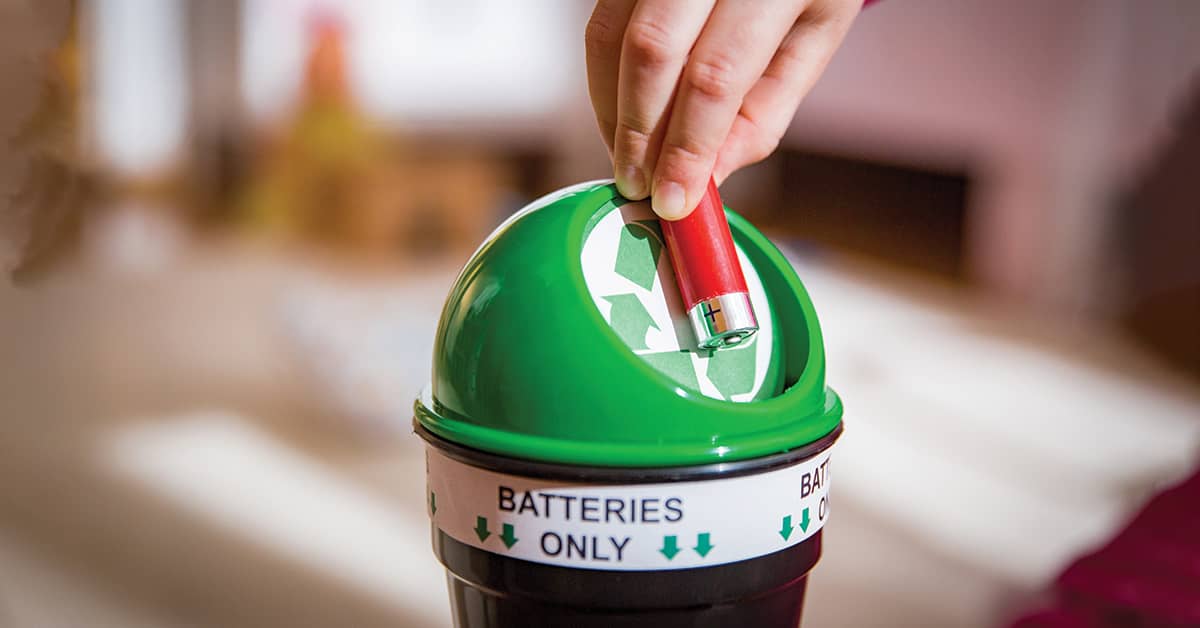Understanding state and federal requirements for universal waste
Date Posted: 08/21/2023

While solid nonhazardous waste is easily managed and typically regulated at the state or municipal level, employers that generate hazardous waste face more challenges. The Environmental Protection Agency (EPA) created regulations to streamline the management of certain types of hazardous waste known as universal wastes.
EPA’s federal universal waste regulations in 40 CFR part 273 apply to five specific types of waste:
- Batteries
- Lamps
- Pesticides
- Mercury-containing equipment
- Non-empty aerosol cans
Organizations must manage and store these materials in a way that prevents releases to the environment. However, universal wastes do not need to be counted toward an organization’s hazardous waste generator category totals, so managing universal waste could potentially reduce the hazardous waste generator category.
In the universal waste system, EPA regulates four types of participants:
- Small quantity handlers of universal waste (SQHUWs) that accumulate less than 11,000 pounds (5,000 kilograms) of universal waste at any time during a year.
- Large quantity handlers of universal waste (LQHUWs) that accumulate 11,000 pounds (5,000 kilograms) or more total universal waste at any time during a year.
- Universal waste transporters.
- Universal waste destination facilities.
A hazardous waste manifest is not required for shipping universal waste, but regulations do require that the waste be sent to either a recycler or a permitted hazardous waste disposal facility. Generally, these materials may be stored for a year prior to shipment off site.
Check state regulations
As with most environmental legislation, universal waste programs vary depending on the state. State adoption of the federal universal waste rules is generally optional, and states can create different standards for universal waste altogether. One notable exception is batteries, which are covered by the Mercury-Containing and Rechargeable Battery Management Act of 1996 and are treated uniformly across all states.
Check state laws for the adoption status of various federal universal waste rules. For example, while pesticides are included in the federal universal waste program, they are not considered universal waste in some states, including California, Maine, and Washington.
On the flip side, some states allow generators to manage additional materials as universal wastes. For example:
- Antifreeze is a universal waste in Louisiana, Michigan, Nevada, New Hampshire, Ohio, Utah, and Wisconsin.
- Cathode Ray Tubes (CRTs) are an additional universal waste stream in California, Maine, New Hampshire, Rhode Island, and Vermont.
- Paint and Paint-Related Wastes can be managed as universal wastes in Texas and Ohio.
- Electronics are considered universal waste in many states including Arkansas, California, Colorado, Connecticut, Louisiana, Michigan, Nebraska, and New Jersey.
- Pharmaceuticals may be considered universal waste in Michigan and Florida.
This is not an exhaustive list; other items such as ballasts, barometers, compressed gas cylinders, and even solar panels have status as additional universal wastes in some states. Review the rules in your state to see what other limitations, and potential opportunities, apply to your organization’s universal waste management program.
The five federal universal wastes share several similarities in their proper management (including storage to prevent release and proper labeling of containers), but each waste poses unique hazards to employees and the environment. In addition, states may impose different requirements or establish rules for additional wastes. With a little bit of due diligence, however, these wastes can be effectively managed.
How Safety Management Suite Can Help
Every organization creates waste, but disposing of hazardous or universal waste can make compliance more complex. To learn more about properly managing these waste streams, join our webcast Hazardous and Universal Waste: Cradle-to-Grave, are you in compliance? on Thursday, August 31, 2023. We’ll cover the fundamentals of hazardous waste identification, regulations specific to wastes, and best practices to optimize your hazardous waste program. Log in or register for a free trial and save your seat today!
E-mail Newsletter
Sign up to receive the weekly EHS Insider email newsletter for safety articles, news headlines, regulatory alerts, industry events, webcasts, and more.